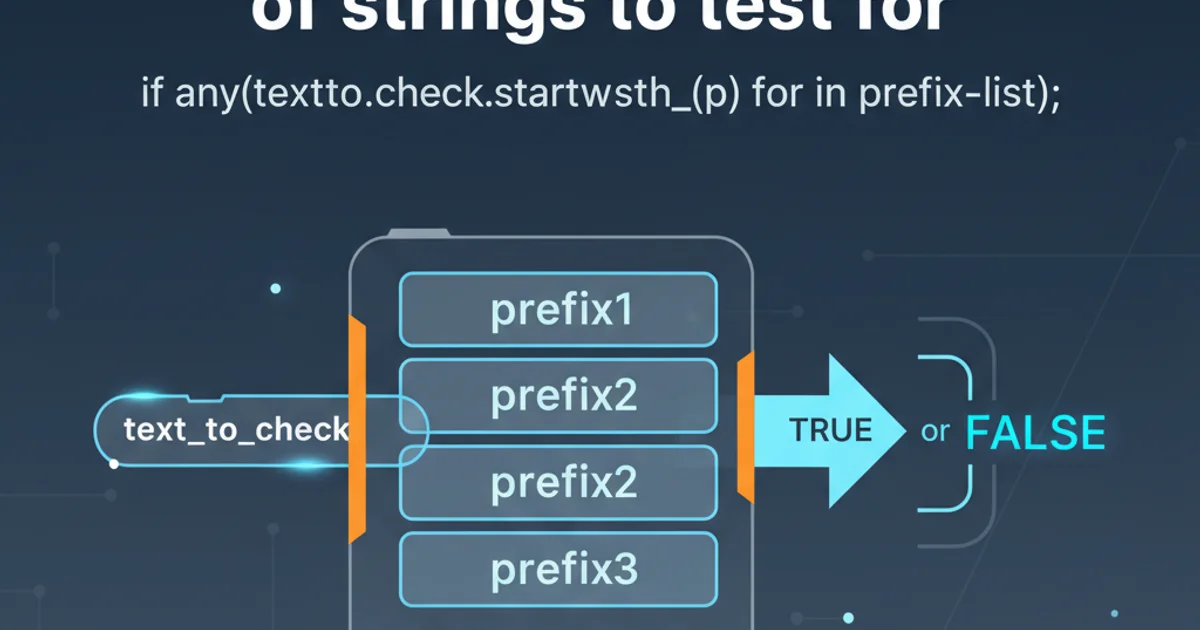str.startswith with a list of strings to test for
Categories:
Efficiently Checking if a String Starts With Any of a List of Prefixes in Python

Learn various Pythonic ways to determine if a string begins with any of several possible prefixes, enhancing your string manipulation skills.
In Python, the str.startswith() method is a powerful tool for checking if a string begins with a specific prefix. However, what if you need to check against multiple possible prefixes? This common scenario arises in tasks like parsing user input, filtering data, or routing requests based on URL patterns. This article explores several efficient and Pythonic methods to achieve this, from basic loops to more advanced techniques, ensuring your code is both readable and performant.
The Basic Approach: Iterating Through a List
The most straightforward way to check if a string starts with any of a list of prefixes is to iterate through the list and apply str.startswith() for each prefix. This method is easy to understand and implement, making it a good starting point, especially for smaller lists of prefixes.
def starts_with_any_loop(text, prefixes):
for prefix in prefixes:
if text.startswith(prefix):
return True
return False
# Example usage:
my_string = "hello world"
prefix_list = ["hi", "hello", "hey"]
if starts_with_any_loop(my_string, prefix_list):
print(f"'{my_string}' starts with one of the prefixes.")
else:
print(f"'{my_string}' does not start with any of the prefixes.")
my_string_2 = "goodbye world"
if starts_with_any_loop(my_string_2, prefix_list):
print(f"'{my_string_2}' starts with one of the prefixes.")
else:
print(f"'{my_string_2}' does not start with any of the prefixes.")
Using a simple loop to check against a list of prefixes.
flowchart TD
A[Start] --> B{Input String and Prefix List}
B --> C{Loop through each Prefix in List}
C --> D{Does String Start With Current Prefix?}
D -- Yes --> E[Return True]
D -- No --> F{More Prefixes?}
F -- Yes --> C
F -- No --> G[Return False]
E --> H[End]
G --> HFlowchart of the basic loop-based prefix checking method.
Leveraging str.startswith() with a Tuple
Python's str.startswith() method is more versatile than many realize. It can accept a tuple of prefixes as its argument, allowing for a much more concise and often more efficient solution than manual iteration. This is the recommended Pythonic approach for this problem.
def starts_with_any_tuple(text, prefixes):
# Ensure prefixes is a tuple for optimal performance
if not isinstance(prefixes, tuple):
prefixes = tuple(prefixes)
return text.startswith(prefixes)
# Example usage:
my_string = "hello world"
prefix_list = ["hi", "hello", "hey"]
if starts_with_any_tuple(my_string, prefix_list):
print(f"'{my_string}' starts with one of the prefixes.")
else:
print(f"'{my_string}' does not start with any of the prefixes.")
my_string_2 = "goodbye world"
if starts_with_any_tuple(my_string_2, prefix_list):
print(f"'{my_string_2}' does not start with any of the prefixes.")
else:
print(f"'{my_string_2}' does not start with any of the prefixes.")
Using str.startswith() with a tuple of prefixes.
str.startswith() with multiple prefixes, it's best practice to pass a tuple. While a list might sometimes work (depending on Python version and internal optimizations), a tuple is explicitly supported and generally more efficient as it's immutable and can be processed directly by the underlying C implementation.Performance Considerations and Best Practices
For most common use cases, the str.startswith(tuple_of_prefixes) method is the most efficient and Pythonic. It's implemented in C, making it significantly faster than a Python-level loop, especially for large lists of prefixes or frequent checks. However, there are a few considerations:
- Tuple Conversion: If your prefixes are initially in a list, convert them to a tuple once if you're going to reuse the prefix collection multiple times. This avoids repeated conversions.
- Empty Prefix List: If the prefix list is empty,
str.startswith(())will always returnFalse, which is the expected behavior. - Regular Expressions: For more complex pattern matching (e.g., checking for prefixes that follow a certain pattern, or case-insensitive checks), regular expressions (
remodule) might be necessary. However, for simple prefix checks,str.startswith()is almost always faster.
import timeit
my_string = "this is a long string that we will test against various prefixes"
prefix_list = ["that", "this", "the", "there", "those", "these", "them", "they", "their"]
prefix_tuple = tuple(prefix_list)
# Test loop approach
time_loop = timeit.timeit(
'for p in prefix_list: if my_string.startswith(p): break',
globals=globals(), number=100000
)
print(f"Loop approach: {time_loop:.6f} seconds")
# Test tuple approach
time_tuple = timeit.timeit(
'my_string.startswith(prefix_tuple)',
globals=globals(), number=100000
)
print(f"Tuple approach: {time_tuple:.6f} seconds")
# Example with an empty prefix list
empty_prefixes = []
print(f"\n'hello'.startswith(tuple(empty_prefixes)): {'hello'.startswith(tuple(empty_prefixes))}")
Benchmarking the loop vs. tuple approach and handling empty prefix lists.